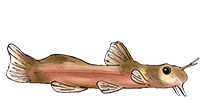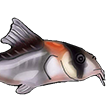Dying Cory's?
Dying Cory's?
This is probably going to be one of the most unusual posts
on this forum because of the "mystery" of it.
I have a standard 29-gallon aquarium. This tank contains 9, 4
month old Rams. My problem is I cannot get new Cory's or Pleco cats
to live in it. The water is 7.2 to 7.5 pH, no ammonia, a GH of 180
and a KH of 86 both ppm. These conditions are created and maintained
by me using crushed coral in my Aqua Clear 50 PF, there is no carbon in the PF only double filter pads and the coral itself, the temperature is 80 degrees. I have well water with no hardness values at all and a natural pH of 5.5 to 5.8. Quite sometime ago I elected to change to the current parameters more closely to a "neutral" tank this was done to match the water conditions of the dealer tanks. Water changes are done at a rate of 4-gallons at a time, treated with Prime, twice weekly.
In addition, the tank contains an under gravel filter with a power head. I have been losing Cory's right along and prefer an under gravel so I installed one.
Old school thinking I suppose. I have returned to the hobby after a 30-year absence and back then I raised and bred Discus for many years, so I'm not exactly a "rookie" but this latest problem has me stumped.
Now for the "mystery" part of this story. I have 1 albino Cory and 1 Julie Cory in this same tank since its setup over 10 months ago. They are fine, forge for food and are going great and act completely normal. But any new cats exhibit the following. They usually go directly to the bottom of the tank and seldom move, not even to eat. Their respiration when compared to the other 2 Cory's seems a bit faster. They exhibit no outward marks or liaisons and they do not have any red or irritating marks or discoloration around the gill area and they do not move around much. I always use the dip method for acclamation and take about an hour or more to do it using a spare heater and air stone. Finally, within 4 to 5 days, they expire without a mark on them.
Any help is welcomed. I have purchased the Cory's from other locations and always with the same result described.
Bill
on this forum because of the "mystery" of it.
I have a standard 29-gallon aquarium. This tank contains 9, 4
month old Rams. My problem is I cannot get new Cory's or Pleco cats
to live in it. The water is 7.2 to 7.5 pH, no ammonia, a GH of 180
and a KH of 86 both ppm. These conditions are created and maintained
by me using crushed coral in my Aqua Clear 50 PF, there is no carbon in the PF only double filter pads and the coral itself, the temperature is 80 degrees. I have well water with no hardness values at all and a natural pH of 5.5 to 5.8. Quite sometime ago I elected to change to the current parameters more closely to a "neutral" tank this was done to match the water conditions of the dealer tanks. Water changes are done at a rate of 4-gallons at a time, treated with Prime, twice weekly.
In addition, the tank contains an under gravel filter with a power head. I have been losing Cory's right along and prefer an under gravel so I installed one.
Old school thinking I suppose. I have returned to the hobby after a 30-year absence and back then I raised and bred Discus for many years, so I'm not exactly a "rookie" but this latest problem has me stumped.
Now for the "mystery" part of this story. I have 1 albino Cory and 1 Julie Cory in this same tank since its setup over 10 months ago. They are fine, forge for food and are going great and act completely normal. But any new cats exhibit the following. They usually go directly to the bottom of the tank and seldom move, not even to eat. Their respiration when compared to the other 2 Cory's seems a bit faster. They exhibit no outward marks or liaisons and they do not have any red or irritating marks or discoloration around the gill area and they do not move around much. I always use the dip method for acclamation and take about an hour or more to do it using a spare heater and air stone. Finally, within 4 to 5 days, they expire without a mark on them.
Any help is welcomed. I have purchased the Cory's from other locations and always with the same result described.
Bill
- Birger
- Expert
- Posts: 3870
- Joined: 01 Dec 2003, 05:04
- My articles: 10
- My images: 112
- My cats species list: 49 (i:43, k:0)
- Spotted: 35
- Location 1: Edmonton,Alberta
- Location 2: Canada
Re: Dying Cory's?
One quick question...how long are the fish in the bags as you are bringing them home or before you begin the drip (is this what you meant) method?
birger
birger
Birger
Re: Dying Cory's?
Hi birger,
The fish only are in the bags for transport, aabou 30 minutes then they are dumped into a large heavy plastic container for the dipping. In this way I can use a heater and air-stone without worry of damage to the fish. Plenty of room.
Bill-------and thanks for the reply
The fish only are in the bags for transport, aabou 30 minutes then they are dumped into a large heavy plastic container for the dipping. In this way I can use a heater and air-stone without worry of damage to the fish. Plenty of room.
Bill-------and thanks for the reply
- Birger
- Expert
- Posts: 3870
- Joined: 01 Dec 2003, 05:04
- My articles: 10
- My images: 112
- My cats species list: 49 (i:43, k:0)
- Spotted: 35
- Location 1: Edmonton,Alberta
- Location 2: Canada
Re: Dying Cory's?
What is this dip method...bear with me I am trying to go somewhere with this.
Birger
-
andywoolloo
- Posts: 2751
- Joined: 02 Dec 2007, 02:55
- I've donated: $100.00!
- My cats species list: 12 (i:0, k:0)
- My aquaria list: 2 (i:2)
- Location 2: Sanger, California
Re: Dying Cory's?
I do not understand the addition of crushed coral for rams or cories.
Do you mean German blue rams? Both GBR & corys like lower ph.
Do you mean German blue rams? Both GBR & corys like lower ph.
- Dave Rinaldo
- Posts: 2178
- Joined: 31 Dec 2002, 10:49
- I've donated: $601.00!
- My images: 238
- My cats species list: 64 (i:0, k:0)
- Spotted: 97
- Location 2: Austin, Texas
Re: Dying Cory's?
"I do not understand the addition of crushed coral"
I have well water with no hardness values at all and a natural pH of 5.5 to 5.8. Quite sometime ago I elected to change to the current parameters more closely to a "neutral" tank this was done to match the water conditions of the dealer tanks.
-
andywoolloo
- Posts: 2751
- Joined: 02 Dec 2007, 02:55
- I've donated: $100.00!
- My cats species list: 12 (i:0, k:0)
- My aquaria list: 2 (i:2)
- Location 2: Sanger, California
Re: Dying Cory's?
oh, I see, sorry , need to read more closely. Sorry I am sleepy.  I'm with you all now.
I'm with you all now.
Re: Dying Cory's?
Sorry Eveyone!!!1
My spelling! Not Dip Method! DRIP Method
Bill
My spelling! Not Dip Method! DRIP Method
Bill
- Birger
- Expert
- Posts: 3870
- Joined: 01 Dec 2003, 05:04
- My articles: 10
- My images: 112
- My cats species list: 49 (i:43, k:0)
- Spotted: 35
- Location 1: Edmonton,Alberta
- Location 2: Canada
Re: Dying Cory's?
What I was getting at is the drip method is one of these old school methods...here is a better explanation than I could give as to why from one of our other regulars (apistomaster). I was thinking maybe your fish were spending too much time in their shipping water and the resulting toxic amonia is affecting them in some way. As soon as the bag is opened it begins the process outlined below.Old school thinking I suppose. I have returned to the hobby after a 30-year absence
The old water is disposed of to help minimize any risks.If your fish are being shipped or have to spend many hours bagged for some reason, the drip acclimation method can be counter productive. Ammonia can rapidly reach dangerous levels inside the bags. At the same time the CO2 levels increase. Co2 dissolved in water produces carbonic acid which lowers the pH below 7.0. The pH drop reduces the toxicity of ammonia. When you do a slow drip acclimation the fish are left in the ammonia laden water which quickly loses the excess CO2, pH rises above 7.0, causing the ammonia to become toxic.
All this is stressful, can cause damage to the gills and results in weakened fish more susceptible to diseases like Ich.
It is better to just equalize the temperature without opening the bag. Then perform the "plop and drop" acclimation method. It is less stressful for the fish. It is best to adjust the water in your tank to be similar to the seller's water before the fish arrive.
All this should have been done using a quarantine tank. None of your other fish can get sick if you quarantine new comers.
Birger
Birger




